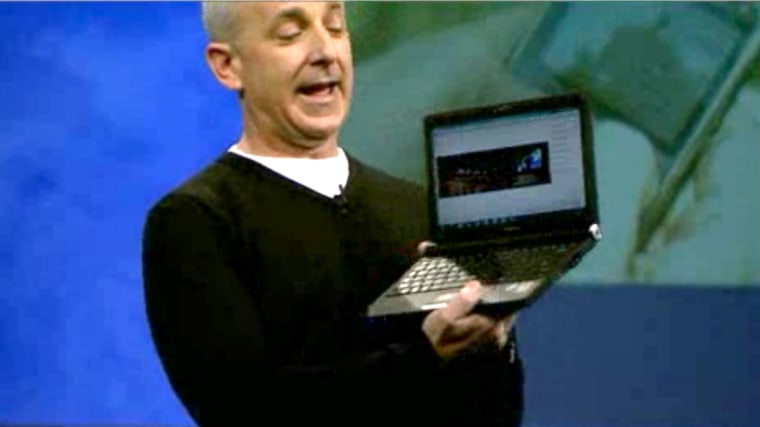Netbooks, the little laptops geared to mainly Web surfing and e-mail, have tiny keyboards, small screens — and the Windows XP operating system on many of them now.
That may be one of the saving graces and selling points of the laptops, which are making a dent in the PC world. A year or so ago, when netbooks first came on the market, most featured the Linux operating system. For many potential buyers, other than technophiles, that was a deal-killer, said Stephen Baker, NPD Group’s vice president of industry analysis.
“Customers don’t want Linux on those machines. Retailers don’t want Linux on those machines,” he said. “The fact that there’s a Windows platform available has been a big reason that we’ve seen a lot of the retailers start to pick these products up and try to get them into mass distribution.” (Msnbc.com is a joint venture of Microsoft and NBC Universal.)
Windows XP is being phased out by Microsoft, much to the chagrin of many users who have not wanted to part with the familiar operating system.
The company stopped putting Windows XP on new PCs last June 30. Small businesses that custom-build PCs have until the end of this month to order XP, and until May 30 to take delivery of it for their machines.
But netbooks can come with Windows XP until at least June 30, 2010 or one year after the availability of the next operating system, whichever is later, Microsoft said last year.
That strategy was taken, in part, to make sure Linux did not become the dominant operating system for netbooks, and because Windows Vista, Microsoft’s current OS, was so unpopular, said Michael Cherry, analyst for Directions on Microsoft, an independent research firm.
“Initially these netbooks were coming out with a configuration that wouldn’t support Vista,” he said. “And I think there was concern that if you didn’t have some offering, that all these machines would be sold with Linux on them. So, Microsoft has allowed manufacturers to continue to provide Windows XP.”
A matter of space
Among the issues with Vista has been the memory and hard drive space required for it to run. Microsoft says on its Web site that Vista Home Basic needs at least 512 megabytes of memory and 15 gigabytes of space available on a 20 GB hard drive.
The earliest netbooks, which generally weigh between 2 and 3 pounds, came with 512 MB of RAM and 2- or 4 GB flash drives.
Windows XP Home Edition literally has been a better fit than Vista for most netbooks, requiring at least 64 megabytes of RAM, and 1.5 GB of hard drive space, according to the company.
Of course, XP is on its way out and Windows 7 is on its way in, and the faster the better, Microsoft hopes, to banish the image problems and slower adoption rate of Vista, available for nearly two years.
At the end of December, Microsoft had 90.7 percent of the operating system market, according to Net Applications, with Windows XP specifically having about a 65 percent market share, and Windows Vista, 21 percent. Linux had less than 1 percent of the operating system market.
Preparing Windows 7
Microsoft is letting users download free beta, or test, versions of Windows 7, expected to be released in final form late this year or early next. Windows 7 essentially is built on the same foundation as Windows Vista, but with some key improvements in terms of speed and hard drive space requirements.
And Windows 7 is envisioned as being netbook-friendly, so much so that Microsoft senior vice president Steve Sinofsky praised the new operating system’s efficiencies as he waved a netbook in front of the audience at the Professional Developers Conference last fall.
“I am currently using this netbook, with a 1 GHz processor and 1 GB of RAM, and it’s running Windows 7, and when I boot it, about half that RAM is still available.
“I’m pretty excited about this class of machine…and the work we can do to deliver Windows 7” on it, he said.
Netbooks generally cost between $300 and $400, and the economy may help fuel their growth, especially as second computers in households.
Newer models are bulking up to near-laptop specifications — and prices.
At last week’s Consumer Electronics Show in Las Vegas, HP announced a new version of its HP Mini netbook. The 2.6-pound laptop, with a 10.1-inch screen, a keyboard that is 92 percent of the size of a regular keyboard and an 80 GB hard drive, will start at $499 when it goes on sale this month.
The company notes up to 8 GB using Windows XP or XP Pro, and up to 10 GB using Windows Vista is “reserved for system recovery software.”
Acer’s sapphire blue Aspire One netbook, introduced last fall, has been among the strong sellers for the company and its line of little laptops, which has been a bright spot for the computer maker.
The 2.2-pound computer has an 8.9-inch screen and retails for around $350. It comes with 1 GB of RAM, 120 GB hard drive and Windows XP Home.
Here for the long haul?
Baker, of NPD Group, says he’s not sure yet whether netbooks are a success story or a fad.
“They’ve been ramping up nicely, but it’s too early to say what the long-term or medium-term impact of them is going to be,” he said.
One thing is for sure, he said: Putting Linux on them is not going to help sales. He estimates that 90 percent of netbooks sales are devices that have Windows XP on them.
“Linux just isn’t a platform for the mass market,” he said. “All the early reports of lots of returns of Linux netbooks were because people bought them with that and didn’t know what to do with it.”
